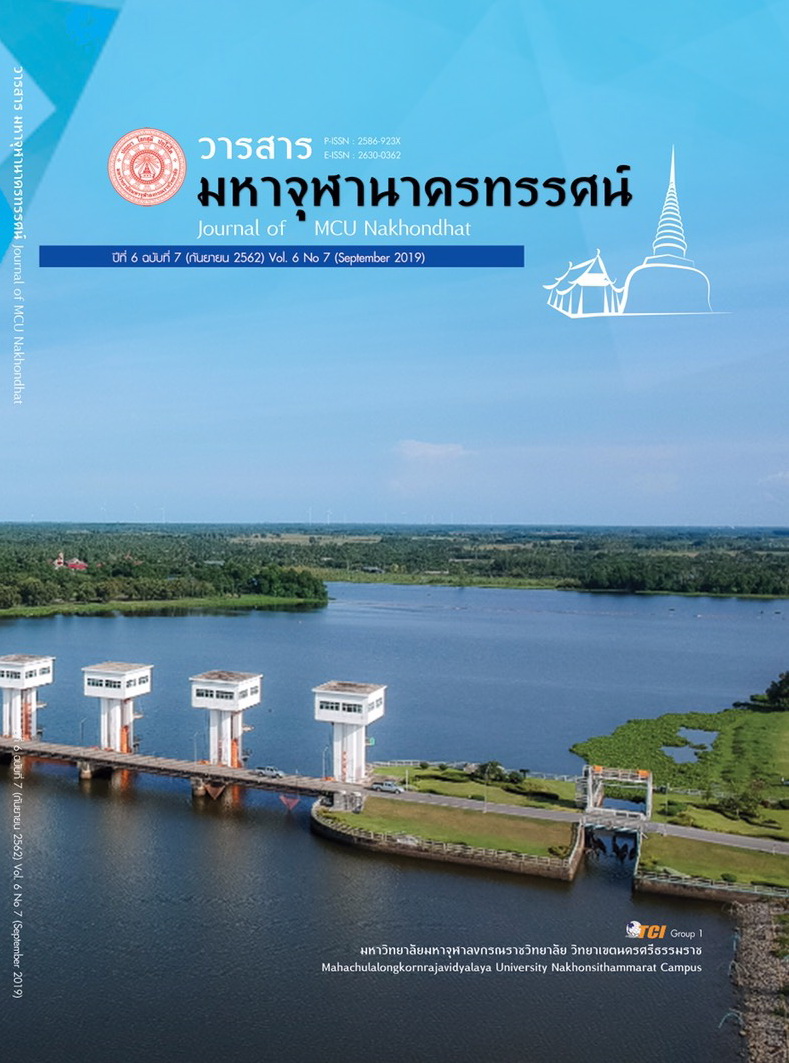AN APPLICATION OF Q METHODOLOGY IN DEVELOPING A 4.0 LEADERSHIP MODEL FOR SCHOOL ADMINISTRATORS
Main Article Content
Abstract
The purposes of this study were to develop a leadership model of school administrators based on the wisdom of 4.0 era of Thailand. The research process consisted of four phases. In the first step, the researcher studied leadership theories through analysis of relevant documents, textbooks, articles, and researches (Document Analysis) and the researcher conducted interviews with 5 experts who had both expertise and experiences in the subject concerned. Next, the researcher constructed the 4.0 leadership model by using Q Methodology with 16experts. The conducted a survey for the appropriateness of the model by 274 school administrators in Northeast of Thailand. Lastly, the research took the verification for the appropriateness of the model through the 9 experts’ group meeting and an evaluation form.
The findings were as follows:
The 4.0 leadership model for the school administrators consists of 3 factors; In the 4.0 era, leaders with visions and commitment to their ideology have the following characteristics in common: having clear and far reaching visions in leading their organizations, leading their organizations with moral and ethics, being determined and committed to their professional’s ideology, being able to continuously manage and adapt their organizations in accordance with ever-changing context of 4.0 era, encouraging members to remain committed to organization’s common goal etc. Leaders of 4.0 era are found to have the following characteristics in the area of organization’s administration and management: Ability to lead member individually and manage the organization as a whole, creative and initiative thinking, communication and interpersonal skills, creativity in manage and solve problems, proactive mindset and behaviors in managing and leading their organizations, being an enthusiastic learner etc. In the area of good governance, leaders of the 4.0 era are found to have the following characteristics; being committed to their principle and lead their organizations with honesty and integrity, having charismatic behaviors, being reliable and trustworthy, being supportive in creating common value in workplaces on teamwork and coordinated work, being able to manage organization with responsibility and accountability, having transparency etc. Upon being surveyed on appropriateness of the leadership model asserted by the current study, managing members of surveyed schools expressed their highest level of agreement towards every factors of the proposed model. Finally, the proposed leadership model received experts’ evaluations in 4 aspects; utility, feasibility, propriety, and accuracy. It was given highest ratings in all aspects.
Article Details
References
ชัยวิชิต เชียรชนะ. (2555). วิธีวิทยาคิว: มโนทัศน์และการประยุกต์ใช้กับการวิจัยทางการศึกษา. วารสารวิชาการสมาคมสถาบันอุดมศึกษาเอกชนแห่งประเทศไทย (สสอท.), 18(2), 179-185.
ชาญ คำภิระแปง. (2560). รูปแบบการเสริมสร้างภาวะผู้นำการเปลี่ยนแปลงในศตวรรษที่ 21 ของผู้อำนวยการกลุ่มนโยบายและแผน สังกัดสำนักงานคณะกรรมการการศึกษาขั้นพี้นฐาน. ใน ดุษฎีนิพนธ์ปรัชญาดุษฎีบัณฑิต สาขาวิชาผู้นำทางการศึกษาและการพัฒนาทรัพยากรมนุษย์. มหาวิทยาลัยราชภัฏเชียงใหม่.
ดนุช ตันเทิดทิตย์. (2555). การประยุกต์ใช้วิธีวิทยาคิวในการพัฒนารูปแบบภาวะผู้นำแนวพุทธ สำหรับผู้บริหารสถานศึกษา. ใน ดุษฎีนิพนธ์ปรัชญาดุษฎีบัณฑิต สาขาวิชาการบริหารการศึกษา. มหาวิทยาลัยราชภัฏอุดรธานี.
ทัศนะ เกตุมณี. (2560). การพัฒนารูปแบบภาวะผู้นำแห่งอนาคตสำหรับอธิการบดีมหาวิทยาลัยเอกชน. ใน ดุษฎีนิพนธ์ปรัชญาดุษฎีบัณฑิต สาขาวิชาการบริหารการศึกษา. มหาวิทยาลัยราชภัฏอุดรธานี.
นราวิทย์ นาควิเวก. (2560). บทบาทผู้นำที่ดีในยุค 4.0 (Skill Set สำหรับผู้นำทุกระดับ). เรียกใช้เมื่อ 24 สิงหาคม 2560 จาก https://www.smartsme.tv/content/63868
นันทวรรณ อิสรานุวัฒน์ชัย. (2550). ภาวะผู้นำที่พึงประสงค์ในยุคโลกาภิวัตน์: ศึกษาจากหลักพุทธธรรม. ใน วิทยานิพนธ์พุทธศาสตรมหาบัณฑิต สาขาวิชาพระพุทธศาสนา. มหาวิทยาลัยมหาจุฬาลงกรณราชวิทยาลัย.
พสุ เดชะรินทร์. (2560). ผู้นำในยุค 4.0. เรียกใช้เมื่อ 14 กันยายน 2560 จาก https://www.bangkokbiznews.com/blog/detail/641042
ไพฑูรย์ สินลารัตน์ และคณะ. (2560). ก่อนถึงโรงเรียน 4.0: โรงเรียนเชิงสร้างสรรค์. กรุงเทพมหานคร: วิทยาลัยครุศาสตร์ มหาวิทยาลัยธุรกิจบัณฑิตย์.
สุชาติ ประสิทธิ์รัฐสินธุ์ และ กรรณิการ์ สุขเกษม. (2550). นานานวัตกรรมวิธีวิทยาคิว (Q methodology) การศึกษาสภาวะจิตวิสัยเชิงวิทยาศาสตร์: แนวคิด ทฤษฎี และการประยุกต์ใช้. กรุงเทพมหานคร: สามลดา.
สุเทพ พงศ์ศรีวัฒน์. (2560). การศึกษาภาวะผู้นำเพื่อการบริหารและการนำคณะของคณบดีคณะเทคโนโลยีอุตสาหกรรม มหาวิทยาลัยราชภัฏเชียงราย ประจำปีงบประมาณ พ.ศ.2560. ใน รายงานการวิจัย. มหาวิทยาลัยราชภัฏเชียงราย.
สุวิทย์ เมษินทรีย์. (2560). ประเทศไทย 4.0 Thailand 4.0 คือ. เรียกใช้เมื่อ 24 เมษายน 2560 จาก https://www.facebook.com/drsuvitpage/
Barbara, S. M. (2017). Leadership traits, divergent thinking, and innovation in Higher Education. In Doctor of Philosophy Thesis in the College of Education. Eastern Michigan University.
Booyens, S. W. (1993). Dimensions of nurshing management. Eppindust: Juta.
Conger,J. A., & Kanungo, R. N. (1998). Charismatic leadership in organizations. Thousand Oaks, C.A.: Sage.
George, C. (2010). The 21st Century Principal. Retrieved September 14, 2560, from https://connectedprincipals.com/archives/1663
Guskey, T. R. (2000). Evaluating professional development. Thousand Oaks, CA: Corwin Press.
Harhins. (2008). Leapfrog principlep and practicep: Core components of education 3.0 and 4.0. ใน เอกสารการประชุมเรื่อง “การจัดการเรียนรู้ education 4.0 วไลยอลงกรณ์ โมเดล” 1 กรกฎาคม 2559 ณ มหาวิทยาลัยราชภัฏวไลยอลงกรณ์. มหาวิทยาลัยราชภัฏวไลยอลงกรณ์.
Krejcie, R.V., & Morgan, D.W. (1970). Determining Sample Size for Research Activities. Educational and Psychological Measurement, 30(3), 607-610.
Mary Uhl-Bien, Russ Marion, & Bill McKelvey. (2007). Complexity Leadership Theory: Shifting leadership from the industrial age to the knowledge era. The Leadership Quarterly, 18(4), 298-318.
McClelland, D. (1973). Testing for competency rather than for intelligence. American Psychologist, 28(1), 1-14.
Morrison, K. (2002). School leadership and complexity theory. London: Routledge Falmer.
Quigley, M. E. (1997). Quantum organisations. Executive Intelligence, 14(5), 14-15.
Stoner, James A. F., & Wankel, Charles. (1986). Management. 3rd ed. New Delhi: Prentice-Hall.


